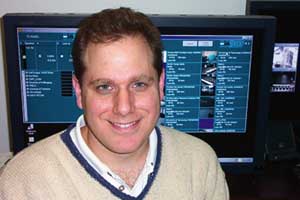University, other city educational institutions form consortium to transform proteomics field
By John EastonMedical Center Public Affairs
 Jonathan Silverstein is serving as the University’s liaison for the Chicago Biomedical Consortium. | |
To help position the Chicago area as a leader in the emerging field of proteomics, the Searle Funds at the Chicago Community Trust have granted $1.5 million to the Chicago Biomedical Consortium for the Proteomics/Bioinformatics Demonstration Project.
The consortium, led by scientists at the University, Northwestern University and the University of Illinois at Chicago, brings together experimentalists, instrumentalists and informaticians to apply new technology and techniques to the study of proteins.
The CBC also could transform how research and training are carried out across the Chicago area, leading to more joint efforts and subsequent joint grants.
“Science is becoming more collaborative. More and more of the extraordinary discoveries are now made by teams,” said Jonathan Silverstein, Director of the Center for Clinical Information and the University’s CBC liaison. “Our consortium taps this expertise of teams wherever the players are, and this enables us to do important interdisciplinary research that one university couldn’t accomplish alone.”
Through the Proteomics/Bioinformatics Demonstration Project, Chicago-area scientists will gain access to crucial, but costly tools, including a Fourier Transform Mass Spectrometer, a powerful instrument for studying the structures of proteins and other biomolecules, as well as added computing power for analyzing the massive amounts of data the spectrometer will produce. Few facilities in the country have such specialized capabilities for proteomics research.
Sited at UIC, the FTMS will enable researchers all across Chicago—not just those from the consortium—to reveal the structures of single proteins and protein complexes, allowing scientists to examine and compare the proteomic configurations of normal cells with those of cells afflicted by diseases and disorders. The FTMS should be in place and in use by the summer of 2005.
The Chicago Biomedical Consortium has already established an unprecedented citywide collaboration in the biomedical sciences. During two years of strategic planning under a grant from the Searle Funds at the Chicago Community Trust, the CBC has sponsored two citywide symposia and numerous meetings among scientists and administrative leaders.
The consortium also will sponsor a conference on practical proteomics in the spring of 2005 to prepare scientific teams to use the FTMS for their research.
As a demonstration of institutional commitment, each of the three universities will contribute an additional $150,000 to the Proteomics/Informatics Demonstration Project for a total budget of nearly $2 million.
“One sign of progress in a scientific discipline is the expansion of effort and technology necessary to come up with genuinely novel and significant results,” said Richard Saller, Provost of the University. “We have seen this in physics since the days of the Manhattan Project, and the CBC collaboration is a good example of ‘big science’ in the realm of biology, pulling together resources from three universities.”
![[Chronicle]](/images/sidebar_header_oct06.gif)